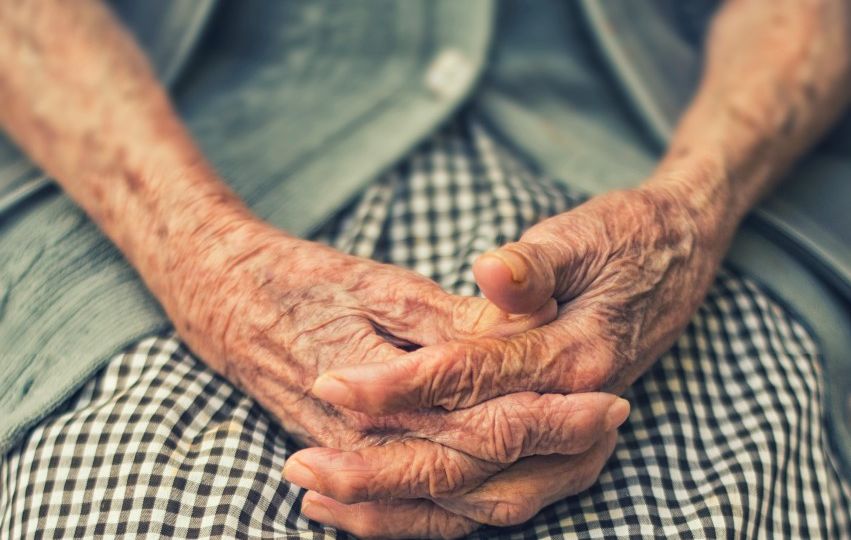
During my time working for the Regenstrief Institute IU Center for Aging Research and the Indiana Alzheimer’s Disease Research Center, not only did I learn so much about the aging population, I also met some amazing women doing work in this space.
And the work they are doing will impact so very many people. According to the Alzheimer’s Association, there are more than 50 million American living with Alzheimer’s and other forms of dementia. Those numbers mean that there is a not-small chance that these diseases of the brain will touch your life in one way or another.
We wanted to shine a spotlight on the fantastic strides these Hoosier women are making in the field.
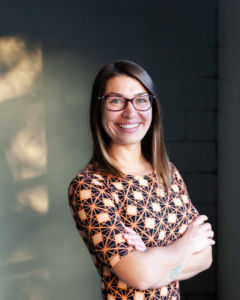 Melinda Winnie, Dementia Programs Supervisor, CICOA/Dementia Friends
Melinda Winnie, Dementia Programs Supervisor, CICOA/Dementia Friends
“We do not have to wait until we are faced with Alzheimer’s Disease or another related dementia to understand how this condition impacts the brain or how we can better support people living with dementia and their caregivers.”
What inspired you to work in the aging industry?
My family’s decade-long journey with caring for my grandmother who lived with Alzheimer’s disease. I always admired that my family (especially my grandfather and mother) was able to keep my grandmother at home throughout the duration of her disease, but I did not fully understand the physical, emotional, and spiritual toll that caregiving had on them until I started hearing similar experiences, concerns, and frustrations from other caregivers.
What is Dementia Friends?
Dementia Friends is a global movement that aims to transform the way people think, act, and talk about dementia. The program was developed by the Alzheimer’s Society in the United Kingdom and has since spread to 56 different countries around the world.
The Dementia Friends movement is underway in 26 states and two territories across the country. Indiana became the 10th state to adopt the movement in August 2017 with CICOA Aging & In-Home Solutions leading the way as the state administrator for the program.
What services does CICOA provide?
CICOA is the largest agency on aging in the state of Indiana and serves Boone, Hamilton, Hancock, Hendricks, Johnson, Marion, Morgan, and Shelby counties. We provide unbiased guidance about available public and private programs and services related to aging, disability and family caregiving; coordinating care plans for in-home services for older adults, people with disabilities, and children or adults with intellectual or developmental disabilities.
What is the most rewarding part of your career?
It is nearly impossible to narrow the most rewarding part of my career down to one thing but having the opportunity to connect with younger generations through Dementia Friends information sessions stands out in my mind. My family struggled pronouncing “Alzheimer’s disease,” let alone understanding the impact that the disease would have on her brain. Having college students approach me at the end of an information session and share that they, too, have experienced something similar or that they look forward to sharing what they have learned with family and friends.
What is one thing you would want people to know about those with dementia/Alzheimer’s?
The brain’s ability to process facts and complex thinking will fall away quickly, but emotions and feelings will remain longer. This is a non-scientific way to explain the changes occurring in a brain with dementia, but it will help us all appreciate what these folks are experiencing.
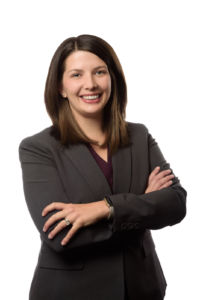 Natalie Sutton, Chapter Executive, Alzheimer Association of Greater Indiana
Natalie Sutton, Chapter Executive, Alzheimer Association of Greater Indiana
“There are resources available and so many ways to be involved in this work”
What inspired you to work in the aging industry?
I joined the team shortly after my grandfather passed away, as he had vascular dementia the last few years of his life. I think about him often during my work. I also think often about my grandmother who was his caregiver, as well as other members of my family that were a part of that journey and his care.
What is Alzheimer’s Association and what services do you provide? What is the most utilized resource?
We are the leading national organization dedicated to Alzheimer care, research, support, and advocacy. We offer care and support resources for the community and they are all completely free and can be accessed 24/7. I would say that our helpline is the most utilized service that we have.
Making the initial call to that line can really make a difference for families. We have data to show that families start to learn more about resources when they have that first phone call that leads to using our other resources. If anyone needs access to our helpline, they can access it at 800-272- 3900.
What is the most rewarding part of your career?
Meeting the families that have been impacted by this disease is rewarding. Once they become a part of the Alzheimer Association community, seeing the difference our work does to help the along their journey is impactful. Seeing our families connect with our resources and finding a sense of relief for not having to do this work alone is meaningful.
What is one thing you would want people to know about those with dementia/Alzheimer’s?
In terms of raising awareness, people are aware that it exists—but people might not know that it is growing. There are so many things that we can do to help not only the person who has the disease but there are resources for caregivers.
What volunteer opportunities are available at the Alzheimer’s Association?
We are a volunteer-powered organization and there are so many ways people can get involved. You can be a community educator, a community representative and participate in our Walk to End Alzheimer’s there is also our event called The Longest Day where people get together and do something, they enjoy for our cause to raise funds. We have seen teams knit together, workout, and so much more. You can get involved here.
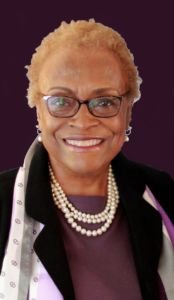 Mollie Richards, Volunteer, Alzheimer’s Association and Indiana Alzheimer’s Disease Research Center
Mollie Richards, Volunteer, Alzheimer’s Association and Indiana Alzheimer’s Disease Research Center
“You are not in this alone. There is help out there and you do not have to do this by yourself.”
What inspired you to work in the aging industry?
When I was 17 years old, I was preparing for college at IU Bloomington. My father began having some problems with his memory was unable to continue working. I left for college for a year but came home to help my mother care for my father while finishing school part-time. My father eventually was placed in a home, but that is how I got started and interested in this work.
What has been your primary focus when it comes to Alzheimer’s and Brain Health?
My focus has been community education since about 1999 with the Alzheimer’s Association, but before that I wrote educational programs for a company I was working with.
I focus a lot on educating people about Alzheimer’s and brain health. With my work at the Indiana Alzheimer’s Disease Research Center we are trying to get people of color involved in research studies. I have been a research participant with them for five years.
As people of color, we are more impacted by Alzheimer’s Disease and my concern is that while more medications are being created, if we aren’t in the research, we don’t know if it will help us. My husband and I are also on the Board of Directors for the Alzheimer ‘s Association of Central Indiana. At the national level I am the subcommittee for diversity, equity, and inclusion for the Alzheimer’s Association.
What are some of the trends that you have seen since you began this work?
I think there is less stigma when it comes to Alzheimer’s. When we first started doing presentations and tabling at health fairs years ago, people wouldn’t even come and talk to us, but now we have great conversations. At health fairs I am intentional to not ask people if they know anyone with Alzheimer’s because that word can be scary—but I’ll say memory loss to get the conversation going.
What are your tips to keep your brain and minds healthy?
There is a lot or research that shows that eating right can be beneficial for brain health. Exercising is so important and aerobic exercise five times a week for 45 minutes can reduce your risk of memory loss by 50%.
We can challenge our brains to read, learn a foreign language, and learn a new skill. I learned in the past year that if you read to your babies and children you can reduce their chances of memory loss by 8%. Also keeping socialization in mind and interacting with other people. We also have to get adequate sleep and try our best to manage stress.
What is the most rewarding part of your career and inspires you to keep going?
The people that say “I didn’t know this. I’m so glad you came.” I’ve had people come into meetings a bit skeptical, but at the end of the meeting they’ll come up to me for a hug. That is keeps me going. So many people do not know the resources and I enjoy providing those. We are also on a radio show every other week to get the resources and information out there. I want to reach more and more people.
How can people listen to the show?
We are live every other Saturday from 10:00-10:30 am. Our next broadcast is June 26, 2021. The show is then posted on Harold Bell’s Facebook page and later on IARDC’s Facebook page. The show can be reached at streaming.radio.com.
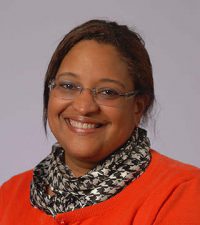 Glenda Westmoreland, Geriatrician, Associate Professor of Clinical Medicine, Eskenazi Health, IU School of Medicine
Glenda Westmoreland, Geriatrician, Associate Professor of Clinical Medicine, Eskenazi Health, IU School of Medicine
“Remember that older adults have a great deal to contribute to society. They have a great wealth of knowledge”
What inspired you to work in the aging industry?
I have two people who inspired me in my life. My mother was a paid caregiver for an elderly neighbor of ours who lived by herself. I would sometimes go over and study at her home sometimes to relieve my mom for a bit. She would say things like “Oh what bright eyes you have” and it was just sad to see her disease progress. When I was in medical school, I wanted to specialize in something that allowed me to care for the whole patient while also being an expert. My last elective as in geriatrics and that’s when I had my aha lightbulb moment. I joined the faculty 26 years ago in July!
What is the most rewarding part of your career?
It is being able to do something small and make a huge difference in a person’s quality of life or maintain their quality of life. In geriatrics right now there is a big push for the Four M’s of Age-Friendly Care from the American Geriatrics Society. For older adults we should check for their mentation, medication, mobility, and the fourth M is what Matters to the patient.
As a provider, we can impose our own goals onto patients, but it’s about what matters to the patient. I had one patient who really wanted to maintain her ability to watch her television shows which shaped my care. I had to make sure she had access to an optometrist to make sure she can see. Is she mobile to reach the remote, things like that can help make her comfortable.
What can be done to spark more interest in geriatrics?
As the population ages we need more geriatricians, and we are working on that here at IU. It is really about those who are currently practicing to model that it is an interesting, rewarding area.
We will have two students joining our fellowship this summer who will become geriatricians and they are inspiring our residents and we are hoping our residents can inspire our medical students.
What has been one of your most fond memories?
There are so many memories, but one patient comes to mind. When I went into this field I did not think much about attrition and seeing my patients die. That is a relationship that I have developed and seeing them die can be hard. One memory I took care of for a couple of decades, and she would come alone and then her son started to come, then her daughter moved her in with her. I ended up connecting with her daughter and when her mother passed her daughter called me and thanked me for caring so much for her mother. I am really invested in the care of my patient. I have also cared for a partner and now care for some of their children.
When it comes to people of color, what does it look like when it comes to brain health?
I think there is a delay in seeking help sometimes in our community. Sometimes we just don’t recognize what is going on or might be fearful to acknowledge it. Stroke is one of the leading causes of dementia so getting ahold of our vascular health can be beneficial. We also must be aware of our diet and what we are consuming. Early intervention and seeking help at the onsite of symptoms is important.
All of our content—including this article—is completely free. However, we’d love if you would please consider supporting our journalism with an Indy Maven membership.









